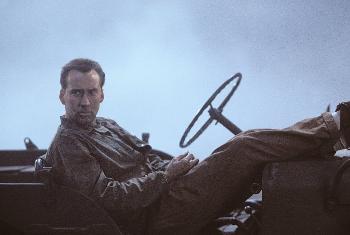Year: 2002
Director: John Woo
In an episode of the 13th season of “The Simpsons”, a rich playboy offers a million dollars to spend a week-end with Marge. Homer accepts but sets his conditions: “No funny stuff! And by funny stuff I mean holding hands, googoo eyes, misdirected woo- which is pretty much any John Woo film.” Witty line, but uncalled for I thought, as Woo is clearly one of the best action filmmakers in the world. After seeing “Windtalkers” though, Homer’s quip doesn’t sounds so inappropriate.
Here’s a movie which can be as ultra-violent and spectacular as Woo’s Hong Kong classics, but which is hopelessly weighed down by smug self-importance and trite melodrama. Even the action scenes, however explosive, get tiresome. The first war scene brutally grabs your attention, as a shot of a quiet river slowly pans to reveal red water and a floating corpse, then all hell breaks loose as Nicolas Cage and his troop fire their machine guns at the Japanese surrounding them. Unfortunately, it’s all downhill after this nearly Malick-good bit, as the film unrolls an endless succession of similar blood-baths, sandwiched between long dull blocks of lousy dialogue.
Cage’s character is Joe Enders, an Italian American Marine who’s still haunted by the death of all his men in his previous mission but is still determined to go back to “killing Japs”. His superiors throw him a curve ball by putting him back into action, but as the escort of Yahtzee! (Adam Beach), a code talker well versed in an army code based on his native Navajo language. This is the only code the Japanese haven’t been able to break, and it’s Enders’ mission to keep Yahtzee! safe… Or to terminate him if he’s in danger of being captured.
The film revolves around how the two develop a nearly homosexual bond in the midst of the horror of war, and it could have made for a compelling story. Woo’s best films explore this kind of male friendship between opposed characters, like the hit-man and the cop of “The Killer”. But that movie had two compelling leads with tangible chemistry, here Cage overacts to ridicule extents and Beach doesn’t register as much but an idiot with a dopey smile. It doesn’t help that the writing is particularly incompetent, excising all depth or nuance in favour of unfunny comic relief, overwritten heart-to-heart conversations about the soldiers’ childhood or what they want to do after the war, and the most half-assed lesson in tolerance this side of an after-school special.
See the racist redneck (Noah Emmerich) reconsider his views after an “Injun” saves his life. See Yahtzee! and Enders bond over American cigarettes. See an All-American soldier (Christian Slater) duet with his code-talker, harmonica to flute. Hear Yahtzee! recount how he named his son George Washington, is that enough sucking up to the country that slaughtered his people and stole their land?! At least, at some point Cage’s character is honest about the movie’s phony portrayal of the oh so spiritual Indians, exclaiming “What a magical pile of Navajo horseshit!”
Then there’s all the gaping holes in the John Rice and Joe Batteer screenplay, be it how the Navajo barely use the code or only to transmit not that secret information, except for one time where Yahtzee! tells troops the location of his unit over the radio but he yells it in English! Or what’s with Enders’ ear injury, which have left him half death and unbalanced but doesn’t stop him from doing fancy Chow-Yun Fat moves on the battlefield! And what about Mark Ruffalo’s character, an overemotional Greek who breaks down and yells “Nooooooooooooo!” to the skies every time someone gets shot. The guy literally has hyper-ventilating crises, then what is he doing in the Marines? Most laughably, why use a plot point about battleships firing to the enemy when you have to resort to obvious stock footage to show it?
The worst thing about “Windtalkers” is how hypocritical it is. For all its denouncing of racism towards Indians, it’s awfully inconsiderate of the Japanese, who are only seen as savage beasts for the Americans to shoot by the hundreds. This dishumanisation of the enemy (reminiscent of the similarly offensive “Black Hawk Down”) makes it impossible to get into the war scenes. Woo is a master of cool, kick ass action, but this is hardly appropriate here. War isn’t cool, and it makes little sense in the context of warfare for a character to go running and jumping around in slow-motion, taking on a dozen armed men with only a knife or a handgun. Woo’s best movies are also about operatic violence driven by the characters, but since we don’t care for anyone here, it only makes for a lot of noise and gushing blood. Misdirected Woo indeed…

